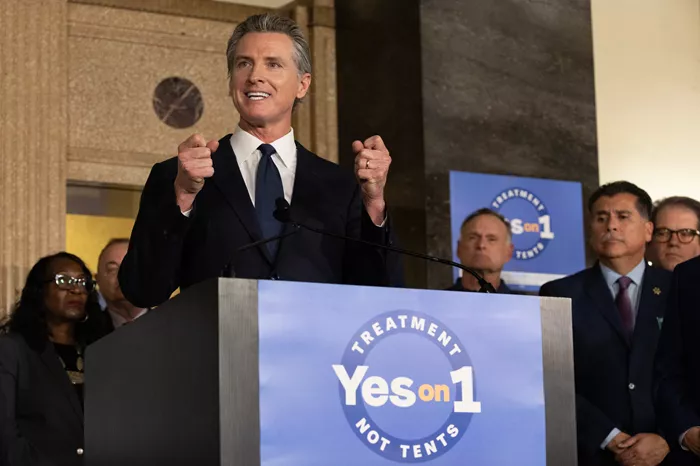Sacramento, California – California voters have narrowly approved Proposition 1, a ballot measure that overhauls the state’s mental health law and authorizes $6.4 billion in bonds for new facilities to house and treat individuals with severe mental illness.
The measure, which was a top priority for Governor Gavin Newsom, passed with 50.2% of the vote in the March 5 election. It rewrites the Mental Health Services Act (MHSA), a 2004 voter-approved measure that imposed a tax on incomes over $1 million.
Key Provisions of Proposition 1
Requires counties to allocate at least one-third of their MHSA funding to housing assistance for clients.
Establishes a $6.4 billion bond to build 11,000 addiction and mental health treatment beds and supportive housing for veterans.
Mandates counties to focus on providing intensive services to individuals living in encampments.
Implications for Newsom’s Agenda
The passage of Proposition 1 is a significant victory for Newsom, who has made addressing severe mental illness and substance abuse a central focus of his policy agenda. The measure provides him with the funding and legal authority to implement his plans to build new treatment facilities, expand housing options, and provide more intensive services to those in need.
Newsom has emphasized the importance of Proposition 1 in tackling homelessness, which is a major problem in California. The measure’s focus on housing assistance and encampment outreach is intended to help individuals with severe mental illness get off the streets and into treatment.
Concerns and Controversies
Despite its passage, Proposition 1 has faced criticism from some disability and civil rights groups. They argue that the measure could lead to a shift towards more involuntary treatment and that it does not adequately address the underlying causes of homelessness and mental illness, such as poverty and lack of affordable housing.
Additionally, some experts have expressed concerns about the feasibility of building 11,000 new treatment beds and supportive housing units within the specified timeframe. They argue that the state faces significant challenges in obtaining land, securing construction permits, and hiring qualified staff.
Next Steps
County health officials have until 2026 to adjust their mental health budgets to reflect the new priorities outlined in Proposition 1. They will need to develop plans for allocating funding to housing assistance and intensive services for individuals living in encampments.
The state will also need to work with local governments and service providers to identify suitable locations for the new treatment facilities and supportive housing units. The construction and operation of these facilities will require significant collaboration and coordination between different levels of government and agencies.
Conclusion
The passage of Proposition 1 represents a major shift in California’s approach to mental health care and homelessness. It provides the state with significant resources to build new treatment facilities, expand housing options, and provide more intensive services to those in need. However, the measure has also raised concerns about involuntary treatment and the feasibility of implementing its ambitious goals. The success of Proposition 1 will ultimately depend on the ability of the state and local governments to overcome these challenges and effectively deliver the promised services to Californians with severe mental illness.

































